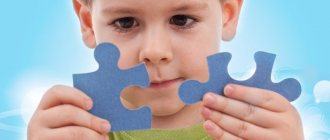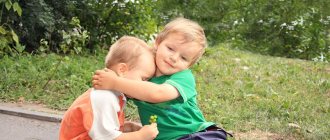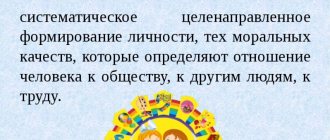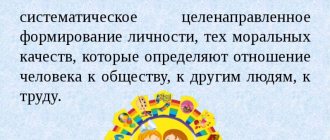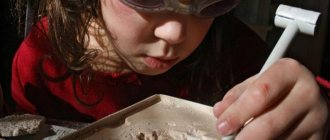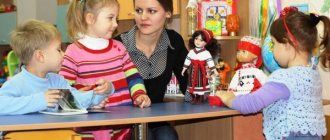Features of social and moral education of preschool children
The social and moral education of children begins from the first years of life and is based on the formation of positive human qualities.
A child in preschool age should be instilled with moral qualities through work activity, creativity and playful forms of education. In the process of communication in preschool institutions, the child shows his character, develops social and moral qualities, positions himself as a citizen and determines his position in society.
In order for the social and moral education of preschool children to be effective, it is necessary to carry out systematic educational work with children. Labor activity plays an important role in the education process, during which the child develops, achieves his goals and improves his skills.
The social and moral education of children should be implemented in close interaction between parents and teachers of preschool educational institutions. The formation of a child’s social and moral qualities should be carried out within the framework of his social life and interaction in the children’s team.
CHILDHOOD GUIDE
The educational field “Social and communicative development” is quite diverse in its objectives and covers a wide range of development of the expected personal qualities of a preschooler. In particular, one of the tasks of this direction is the assimilation of norms and values accepted in society, including moral and ethical values. Thus, moral education is part of the child’s social and communicative development. Already at an early age, children begin to internalize the values of the society in which they live. We can say that social and moral education in children begins with the questions: “What is good? What is bad?
Tasks of social and moral education of preschool children: 1. Formation of the foundations of the moral qualities of the child’s personality, his initial ideas and emotions, behavioral positions. 2. Formation of a careful attitude towards moral, ethical, universal values. 3. Development of self-control and self-awareness of the child in order to comply with certain rules and standards accepted in society.
From here follow the main forms of interaction with children: - acquaintance with works of literature, the plots of which reflect moral problems; — moral and ethical conversations; - writing stories, fairy tales; — game design of problem situations.
Learning opportunities will increase significantly if you use integrated activities or use examples from the children’s own lives. It is necessary to include children in a variety of activities in which they gain concrete experience of moral actions and relationships.
Main forms of interaction with preschoolers:
Introducing children to works of literature whose plots reflect moral problems. The basics of morality can be presented through the plot of a well-known fairy tale or other literary work. For example, after reading the fairy tale “The Three Little Pigs,” you can discuss the situation in which the main characters find themselves and ask: “What bad did the wolf do? Why can’t you do this?” An excellent artistic basis for studying and discussing moral concepts can be the fairy tales “Geese-Swans”, “Three Bears”, “Cinderella”, “Little Red Riding Hood”, “The Golden Key”, “The Ugly Duckling” and many others. In the future, children themselves will be able to find examples of violations of moral norms and values in literary texts.
Moral and ethical conversations. Conversations with children need to be structured in such a way that their moral and ethical understanding acquires a bright, living content for them. Then moral feelings develop more intensively. Therefore, it is necessary to talk with children about the states and experiences of heroes of literary works or heroes of real situations, about the legitimacy of their actions.
Writing stories, fairy tales. The learning process will become creative for both the teacher and the child if it is organized as a research, search activity . For example, based on plots from fairy tales or their own stories, a teacher can invite children to creatively transform the course of the story, come up with different endings, introduce unforeseen situations, combine several plots into one, and so on. These creative tasks will develop the child’s ability to think, reason, and encourage him to independently find solutions and model his own behavior. The preschooler will be able to use specific examples to establish non-compliance with behavioral norms and decide how to correct it. Then the children will be able to come up with short stories themselves, incorporating the acquired knowledge into them.
Game design of problem situations. In this case, it is advisable to organize practical activities , including game situations, role-playing games, dramatization games on moral topics, since moral ethics is formed in the unity of word and deed. The presence of moral elements in the game will allow the teacher to more easily introduce preschoolers to the spiritual values of the world around them. Game models should be built in accordance with the interests and capabilities of children, with their social experience and age characteristics.
When interacting with children, it is necessary to adhere to the principles of humanistic pedagogy , namely: - create an atmosphere conducive to the emergence of new ideas, instilling self-confidence and the desire to speak out; - use children’s mistakes to form a new, positive outlook, rather than to judge.
Dear teachers! If you have questions about the topic of the article or have difficulties in working in this area, then write in the comments . I'll definitely help.
Golovina Bela Gennadievna, site administrator.
Social and legal education of preschool children Spiritual and moral education of preschool children Spiritual and moral education of preschool children Moral education of preschool children through the means of fiction >
Directions of moral development of preschool children
Definition 1
Moral development is the formation in a person of basic moral properties, a meaningful perception of his own personality and its place in the social environment, an understanding of his purpose and the need for continuous improvement of his personality.
Moral development is carried out in the course of moral education.
Moral education is the individual’s assimilation of the fundamentals of morality, the development of moral guidelines for behavior, the assimilation of the fundamentals of the moral functioning of society and the behavioral habits inherent in it.
Moral education is based on moral norms and principles of social behavior. It reflects the continuity of generations and the transfer of social experience.
Are you an expert in this subject area? We invite you to become the author of the Directory Working Conditions
Figure 1. Moral education. Author24 - online exchange of student work
If moral norms are a social category, i.e. they reflect the requirements of society for the behavior of an individual, his compliance with the norms of social interaction, then morality is an internal category, i.e. it is an internal regulator of individual behavior. The moral behavior of an individual in a social environment and its overall development depend on how developed this regulator is.
Moral education begins from an early age of a child. This is relevant because the behavioral habits formed in preschool age become stable foundations of human behavior throughout his life.
Finished works on a similar topic
Course work Moral education of preschool children 410 ₽ Abstract Moral education of preschool children 280 ₽ Test work Moral education of preschool children 230 ₽
Receive completed work or specialist advice on your educational project Find out the cost
The moral education of preschool children is aimed at the formation of an original personality with the skills of social interaction and self-control of behavior. The child must learn to control his actions and actions, express opinions, take into account the needs and interests of another person, develop adequate self-esteem and express his opinions and views, as well as constructively defend his interests in society.
The moral development of a preschooler is focused on the formation of his moral character. The main directions of moral development of a preschooler are:
- Formation of the pupil’s personal properties. It is necessary to create conditions for the disclosure of the natural inclinations of the individual and the disclosure of his potential.
- Moral development of personality. Here, the moral experience of a preschooler’s life is formed, and he masters the experience of social behavior and interaction.
- Developing an adequate attitude towards others: respect for other people’s opinions and points of view, acceptance of someone else’s point of view, different from one’s own, as correct, equality and equivalence of all participants in the social sphere of activity.
- Patriotic education. It is focused on the formation of civic qualities of an individual: love for the Motherland, respect for the customs and traditions of one’s people, awareness of one’s belonging to a particular culture.
- Mastering ethical standards of behavior. They reflect the values of the social environment and the rules of behavior in society, which are unspoken. They are based on the relationship between the interests of the individual and society.
In preschool age, the foundations of moral judgments and assessments are developed. The child comprehends them and learns to apply them in practical activities. In order for a child’s behavior to be formed on the basis of his conditioning by moral norms, it is necessary to organize a system of moral education that takes into account the age-related characteristics of the development of preschoolers and focuses on the social development of the pupil’s personality and his comprehensive humanistic development.
Goals and objectives of moral education
Note 1
The main goal of moral education is to instill moral values, the formation of stable moral qualities, needs, feelings, skills and habits of behavior based on the assimilation of ideals, norms and moral principles, and participation in practical activities.
In general, scientists identify the following moral qualities of a person: kindness, honesty, justice, sincerity, dignity, mercy, love, forgiveness, generosity, wisdom, responsibility, loyalty, tolerance, hospitality, openness, courage, heroism, consent, determination, benevolence, credibility , optimism, moderation, meekness, poise, patience, diligence, initiative, hard work, independence, nobility, frugality, etc.
Work on the moral education of the younger generation in general can be considered as a consistent solution to the following problems:
- Expanding, deepening and systematizing a person’s knowledge about moral norms and rules of cultural behavior accepted in society.
- Formation of cultural behavior skills, compliance with existing rules, moral and ethical standards, development of a negative attitude towards antisocial manifestations in the surrounding life.
- Formation of practical skills, habits of cultural behavior, caring attitude towards people, nature, public property.
- Developing the ability to fairly evaluate one’s own and others’ actions, generalize and accumulate experience of moral behavior.
Note 2
The end result of moral education is moral education - the ability of an individual to consciously reproduce his own behavior on the basis of generally accepted moral qualities, norms and rules, to adequately assess his own behavior and the behavior of others.
The concept of moral education
Modern Russian society finds itself at the epicenter of moral and ethical problems.
The processes of globalization and universalization affect the culture of the country, the destruction of traditional national spiritual values occurs, as a result of this, social evil increases, as well as moral mistrust of each other intensifies, interpersonal and interethnic conflicts are perceived as a common occurrence, empathy disappears, a tendency is established to destroy national cultural traditions, the ideals of young people are reoriented from spiritual to material. The question of the ethical dimension of the negative consequences of imposing elements of Western living standards on our society remains relevant, which further aggravates the crisis of spirituality in Russian society. This can be seen in the devaluation of morality and moral imperatives, as well as in the absence of humane attitudes at the level of interpersonal relationships, thanks to which the full development of personality occurs.
Are you an expert in this subject area? We invite you to become the author of the Directory Working Conditions
Russian society, more than ever, requires the presence of a socially valuable and spiritually stable personality, a “moral person” with a high level of culture, capable of becoming a responsible, active, active subject of social development.
Among researchers there is no definition of the concept of “moral education”; they characterize it as:
- complex integrated process;
- the process of formation of moral qualities, character traits, skills and habits of behavior;
- a social phenomenon that obeys the laws of social development;
- purposeful influence of the older generation on the younger generation in order to develop stable moral qualities in them;
- a purposeful process of organizing and stimulating diverse activities and communication, aimed at mastering a moral culture of behavior and attitude towards the surrounding world;
- a process whose specific functions are carried out according to its own rules and patterns;
- the core of harmonious personality development;
- the form of transformation of experience and the sphere of implementation of human moral culture;
- development of skills and abilities of moral behavior, formation of humane relationships.
Finished works on a similar topic
Course work Moral education - goals, features, methods 460 ₽ Abstract Moral education - goals, features, methods 280 ₽ Test work Moral education - goals, features, methods 250 ₽
Receive completed work or specialist advice on your educational project Find out the cost

